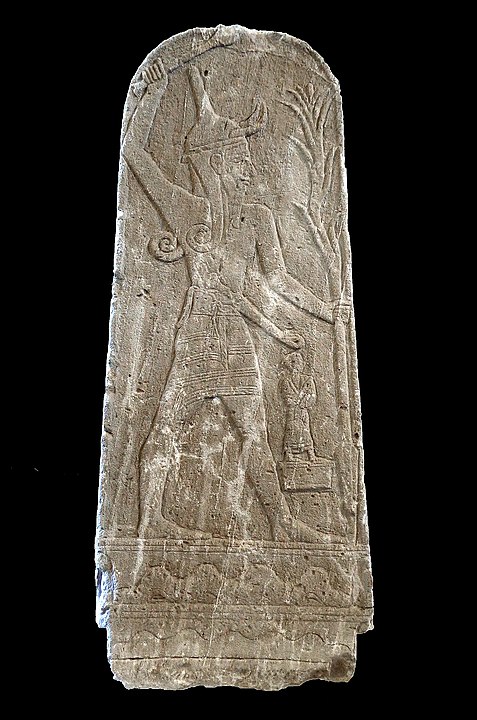List of Pagan Gods from the Bible with References
Table of Contents

Figure 1: Baal Baal with Vegetation Spear - 15c BC - Louvre , Paris
This list contains pagan gods mentioned in the Bible, providing insight into the diverse religious practices that surrounded both the Israelites and early Christians. In the Old Testament, gods from Canaanite, Philistine, and other regions are often mentioned as part of warnings against idolatry. However , the New Testament references only Greek gods, reflecting the cultural dominance of the Greco-Roman world during early Christianity. These references illustrate the tension between Christianity’s monotheism and the polytheism of the Roman Empire.
Baal
- Description: Baal was a major god worshipped in many ancient Middle Eastern communities, especially by the Canaanites. Baal was associated with fertility, weather, rain, and agriculture. His worship often included ritualistic practices and sacrifices.
- Biblical References: Judges 2:13, 1 Kings 18:19
Beelzebub
Description: Beelzebub, often identified with Satan, was a Philistine god of Ekron. The name means “lord of the flies,” and it later became synonymous with evil and demonic forces. Biblical References: 2 Kings 1:2-3, Matthew 12:24
Asherah
- Description: Asherah was a mother goddess worshipped in Canaan and surrounding areas. She was considered the consort of El or Baal and was associated with fertility and motherhood. Asherah poles, which were wooden symbols of the goddess, were often set up near altars.
- Biblical References: 1 Kings 18:19, 2 Kings 23:4
Molech (Moloch)
- Description: Molech was a god worshipped by the Ammonites and Canaanites, often associated with child sacrifice. The worship of Molech was explicitly condemned in the Bible.
- Biblical References: Leviticus 18:21, 2 Kings 23:10
Dagon
- Description: Dagon was a Philistine god of grain and agriculture. He was also considered a fish god by some traditions. The temple of Dagon is notably mentioned in the story of Samson.
- Biblical References: Judges 16:23, 1 Samuel 5:2-7
Chemosh
- Description: Chemosh was the national god of the Moabites. He was associated with war and was believed to require human sacrifices. The Israelites were warned against worshiping Chemosh.
- Biblical References: Numbers 21:29, 1 Kings 11:7
Astarte (Ashtoreth)
- Description: Astarte was a goddess of fertility, sexuality, and war, worshipped in various cultures including the Phoenicians and Canaanites. She is often considered the counterpart of the Mesopotamian goddess Ishtar.
- Biblical References: 1 Kings 11:5, Judges 2:13
Tammuz
- Description: Tammuz was a Sumerian god associated with agriculture, vegetation, and fertility. His death and resurrection were part of a seasonal myth that influenced later religious traditions.
- Biblical References: Ezekiel 8:14
Milcom
- Description: Milcom, also known as Malcam or Milkom, was the god of the Ammonites. He is closely associated with Molech, and the Israelites were warned against worshiping him.
- Biblical References: 1 Kings 11:5, 1 Kings 11:7
Nebo (Nabu)
- Description: Nebo was a Babylonian god of wisdom and writing. He was also associated with prophecy. The name Nebuchadnezzar is derived from Nebo.
- Biblical References: Isaiah 46:1
Bel
- Description: Bel was a title meaning “lord” and was often used to refer to the Babylonian god Marduk. Marduk was the chief god of the city of Babylon, associated with creation and justice.
- Biblical References: Isaiah 46:1, Jeremiah 50:2
Hermes (Mercury)
- Description: Hermes was the Greek god of trade, communication, and travelers. He was also considered a messenger of the gods. In Roman mythology, he was known as Mercury.
- Biblical References: Acts 14:12-13
Adrammelech
- Description: A sun god worshipped by the Sepharvites.
- Biblical References: 2 Kings 17:31
Ashima
- Description: Worshipped in Hammath, Syria.
- Biblical References: 2 Kings 17:30
Nergal
- Description: Babylonian god of war and hunting.
- Biblical References: 2 Kings 17:30
Rimmon
- Description: Syrian weather god.
- Biblical References: 2 Kings 5:18
Queen of Heaven
- Description: Associated with Ishtar, the goddess of love and fertility.
- Biblical References: Jeremiah 7:18
New Testement References
Artemis (Diana)
- Description: Artemis was a major goddess worshipped in the ancient Greek world, particularly in Ephesus where the temple of Artemis was located. She was associated with the hunt, wilderness, and fertility.
- Biblical References: Acts 19:24-35
Zeus (Jupiter)
- Description: Zeus was the king of the gods in Greek mythology, associated with the sky, thunder, and justice. He was equated with the Roman god Jupiter.
- Biblical References: Acts 14:12-13
Castor and Pollux (Dioscuri)
- Description: Castor and Pollux were twin brothers in Greek and Roman mythology, known as the Dioscuri. They were patrons of sailors and associated with the constellation Gemini. Paul sails on a ship named after them
- Biblical References: Acts 28:11